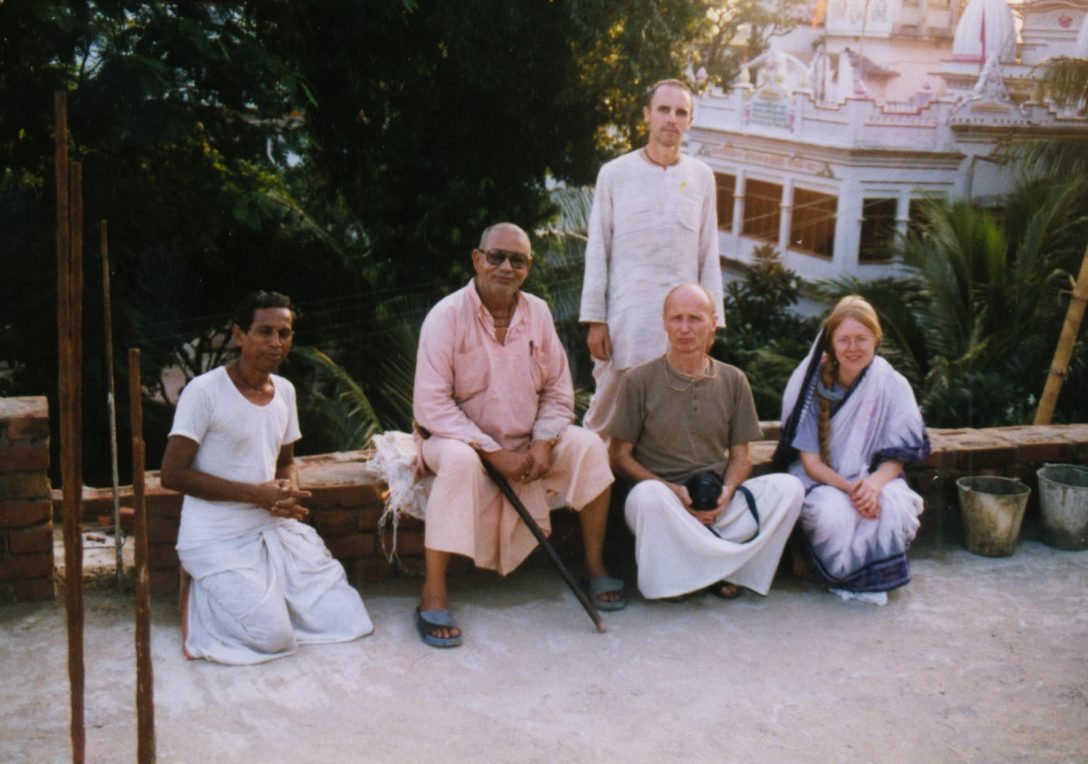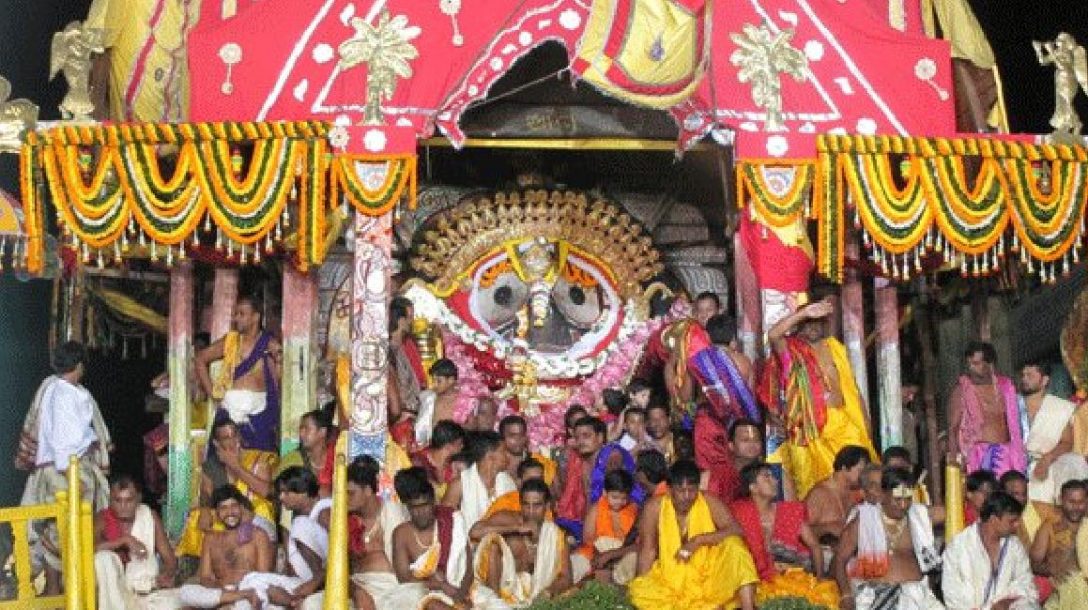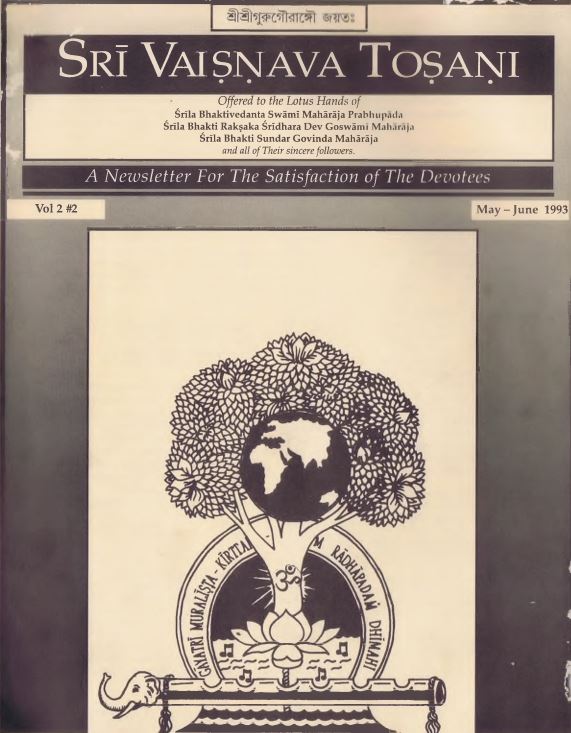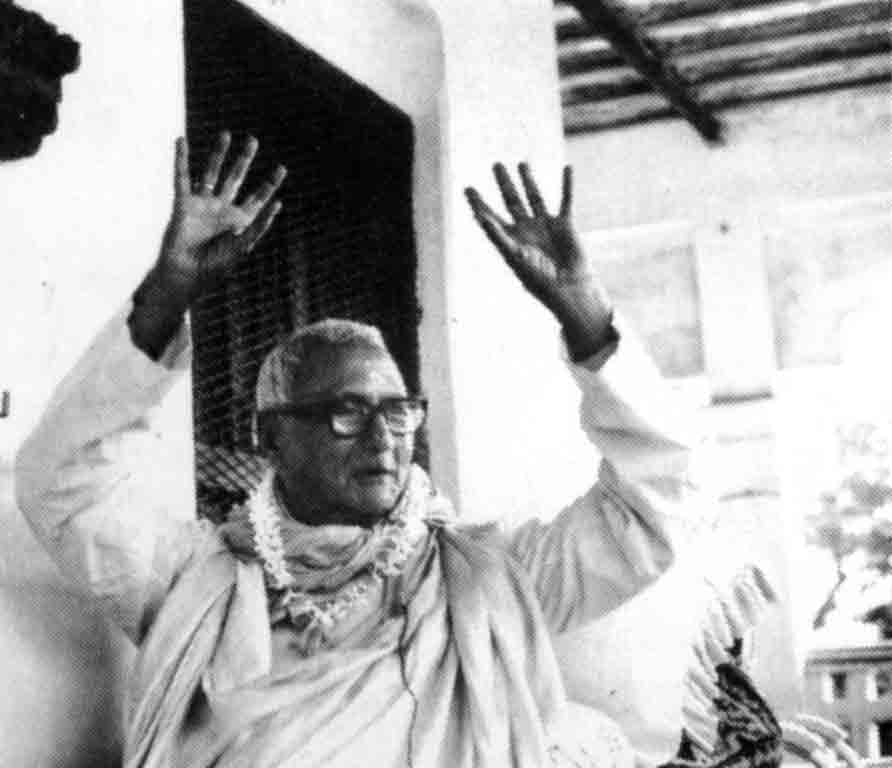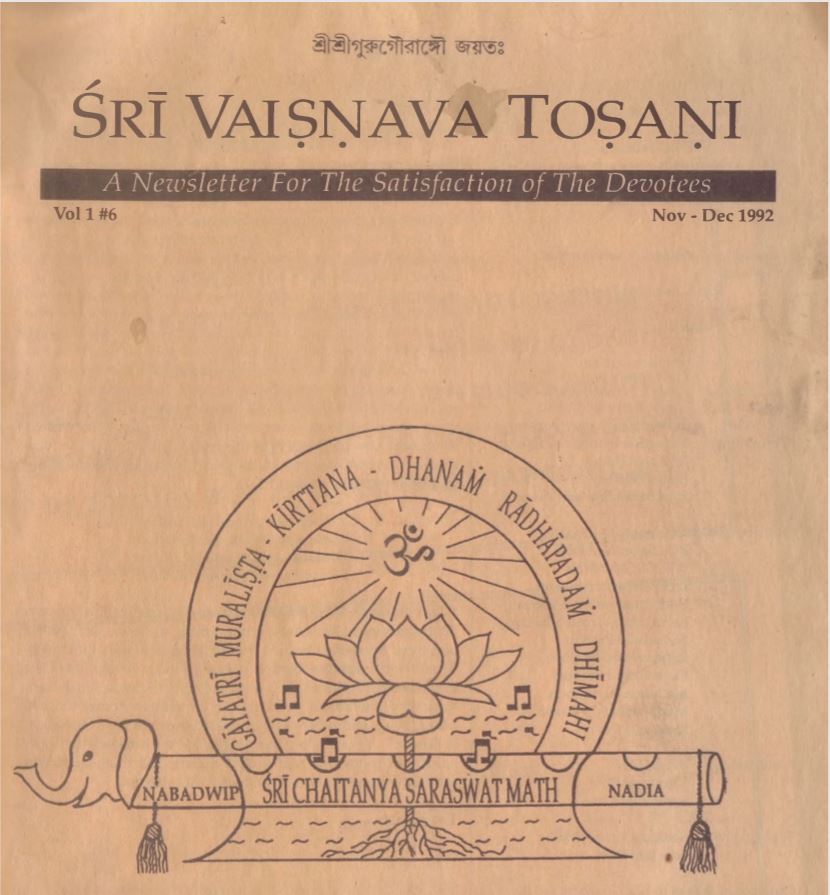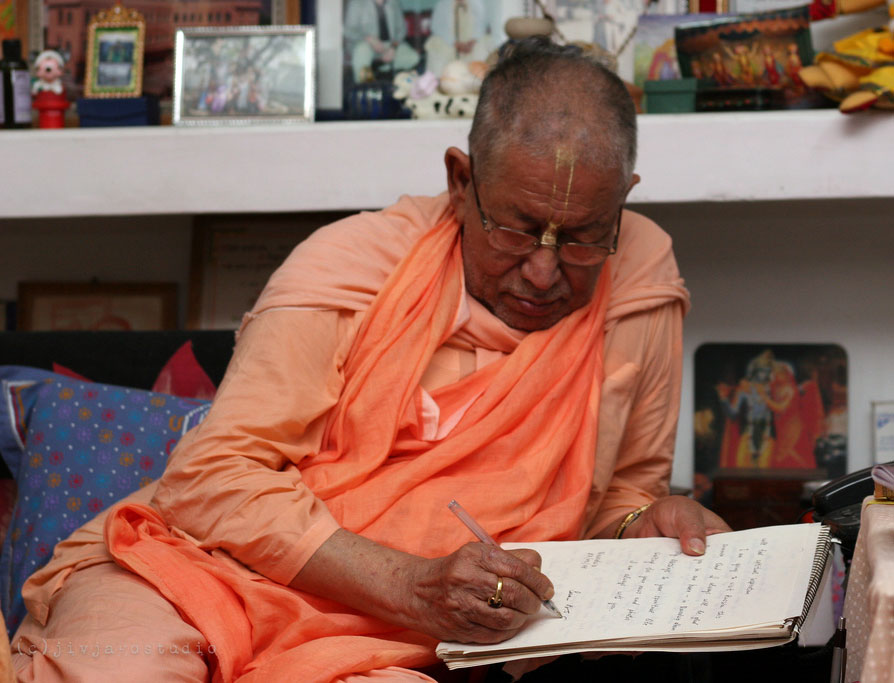Question: Is Kṛṣṇa consciousness the same as Hinduism?
Śrīla Govinda Mahārāj: Previously Hindus were identified by who was living on the bank of the Sindhu River and following the Vedic knowledge and culture. The culture grew on both sides of that river. They were identified as Hindu. The Veda in Hinduism came down from the transcendental level: that knowledge was not made by any one man, but it came from God, and the Hindus followed that Vedic culture and knowledge as their religion.
Our Kṛṣṇa consciousness exists within that Vedic cultural society, but the conception is always different in some way with them. We know that this religion of Vaiṣṇavism has come from Viṣṇu as well as Kṛṣṇa. Kṛṣṇa is our Guru, Kṛṣṇa is our Lord, Kṛṣṇa is the Supreme Personality of Godhead, this is the conception. This conception is written in the Vedas, Vedānta, Upaniṣads, and so many other scriptures and it is indicated as the religion for all jīva-souls. ‘Jīva-souls’ means all the living entities in human form as well as other species of life; there are eighty-four hundred thousand species that are identified as jīva-souls. In the human form there is willing, feeling, and thinking. Within humans there is consciousness, blossoming consciousness, and fully blossomed consciousness. Other life-forms have consciousness but it is more suppressed than in humans. Trees have consciousness but it is suppressed consciousness. It is proved by the scientists now, but we know this knowledge from the time of the Vedic revelation, when it first descended. There are five levels of consciousness flowing.
Kṛṣṇa consciousness is the religion for all the jīva-souls. Here there is no differentiation based on caste, creed, race, colour, or anything else. In Hinduism there is some differentiation between brāhmaṇ, kṣatriya, vaiśya, śūdra, and brahmachārī, vānaprastha, gṛhastha, sannyās, and according to their different levels their living style is indicated. But our religion is not differentiating in that way. We know that we are part and parcel of the Supreme Personality of Godhead, but we are within the illusory environment, and from this illusory environment we need to connect with the transcendental world. And if anyone will follow this religion of the jīva-soul he will be benefitted. This is our conception. Hindusim differentiates between caste and creed, but this is non-sectarian. Īśvara, God, is one, and we are all part and parcel of God. Because we are very tiny jīva-souls, then our power is very little, and because of that we are defeated by the illusory environment. But in this age of Kali there is a super chance, that God has descended as a transcendental vibration form. If we try to satisfy Him through chanting, we can transform our plane from material to transcendental. For the transformation of material consciousness to transcendental consciousness we are practising chanting the Holy Name of the Lord, and we are also following some other Bhakti Yoga practices. This is my answer.
Spoken by Srila Gurudev during his visit to Italy in September 2000
Category: Articles
Sri Jagannathdev
The following article by our Param Gurudev Srila Bhakti Raksak Sridhar Dev-Goswami Maharaj has been excerpted from the magazine ‘Counterpoint’, Vol 1 No 6 Spring ’94, which was published by Sriman Devashis Prabhu.
The full text of that edition can be found here in pdf format
and here in epub format
Braja-rasa in Dwaraka
Sometimes there is a conception amongst the Queens of Dwārakā that, “Although we have Kṛṣṇa as our husband, we feel that somehow He is not Kṛṣṇa in His fullness. He always seems absentminded, as if His heart is not wholly with us.” Pondering the cause of this, the Queens came to know that previously Kṛṣṇa had some very sweet connection with Vṛndāvan and the Gopīs there. Thinking this to be the key to Kṛṣṇa’s absentminded mood, they began searching for an opportunity to find out how Kṛṣṇa was living in Vṛndāvan. They wanted to know about His pastimes there with the Gopīs, and to hear the descriptions from His childhood. Balarām’s mother Rohiṇī had lived in Vṛndāvan during Kṛṣṇa’s childhood, and although she is situated in vātsalya-rasa (parental relationship), she had heard many things about Kṛṣṇa’s Līlā with the Gopīs. So meeting her privately the Queens requested her, “Please describe Kṛṣṇa’s mādhurya-līlā in Vṛndāvan to us.” Rohiṇī was unable to avoid the Queens’ sincere request, and so posting Kṛṣṇa’s sister Subhadrā to keep watch, she began to narrate about His Līlā with the Milkmaids of Vraja.
It so happened that at that same time, Kṛṣṇa and Balarām were taking rest in a nearby room, and as Rohiṇī was describing the Vṛndāvan-līlā, They became aware of what was taking place. Coming to the door where Subhadrā was standing guard, Kṛṣṇa and Balarām could hear the talk of Rohiṇī, and remembering Vṛndāvan, the Gopīs and all these things, a great intensity of feeling came over Them. A great change of feeling came over Kṛṣṇa and Balarām, so great that Their bodies also began to change; just as Mahāprabhu had shown when He fell at the gate of the Jagannāth Mandir and His arms and legs entered into His body. Such a change in the body is possible according to some particular feeling of ecstasy, and feeling the ecstasy of Vṛndāvan, Kṛṣṇa and Balarām were undergoing such a transformation. And Subhadrā, although She had not lived in Vṛndāvan, seeing Her Brothers in this way, She also experienced some sort of sympathetic transformation. Internally that feeling came to Her and externally She was also transformed. The cause of Their disfiguration was the Vṛndāvan statement of Rohiṇī. Remembering that Vṛndāvan-līlā and feeling that, such change came in Their bodies.
Suddenly the group of Rohiṇī could understand that Kṛṣṇa and Balarām were there listening to their talk, and so immediately they stopped. The Līlā thus suspended, the disfigured formation of Kṛṣṇa remained, and He fell into a trance. Nothing could be done to reverse the situation, and so in desperation Kṛṣṇa was taken to the Nava-Vṛndāvan; a replica of Vṛndāvan that had been created in Dwārakā by Brahmā for Kṛṣṇa’s pleasure. Although Kṛṣṇa was awake He could not come out of that mentality, that trance, until He could be taken to that Nava-Vṛndāvan. There in His trance He could only see Baladev, and all others present were eliminated from His vision. Seeing Baladev, Kṛṣṇa was happy that He was in Vṛndāvan. Then He saw Rohiṇī, “Oh yes, it is Vṛndāvan.” Mannequins of all the other residents of Vṛndāvan were also arranged there, and the Queens were following from a distance to see what will happen. After seeing Baladev, Kṛṣṇa sees His cowherd friends Śrīdām and Sudām are also there. In another part the Gopīs are there, and in one part Śrīmatī Rādhārāṇī is standing. Seeing Her mannequin Kṛṣṇa ran and embraced Her, and when Satyabhāmā saw this, some disfigurement also came in Her body. While Kṛṣṇa was in this temperament, Baladev was able to go to Him and gradually he was able to bring Kṛṣṇa back to the consciousness of Dwārakā. The sudden stopping of His experience of Vṛndāvan caused His condition and only by a gradual process, His mentality was again taken to Dwārakā.
This sort of tale is there, and when Dwārakā and Vṛndāvan mix, that is Jagannāth. He is mainly in Dwārakā, but the posing of Vṛndāvan is there. He has infinite forms of Līlā, so what can we trace or know with our finite capacity? In Dwārakā-Saṁhitā we find that there was an arrangement of Rāsa-līlā in Dwārakā also. The Queens had heard that in Vṛndāvan there was the Rāsa-līlā and that it is most wonderful. So when on one occasion the whole Vṛndāvan party was invited to Dwārakā, they privately approached Kṛṣṇa and petitioned Him, “The Gopīs have come, and for a long time it is our hearts’ desire that you will show Your Rāsa-līlā to us. Will You request them?” Kṛṣṇa replied, “If they will give their consent then I have no objection.” The Queens made their request to the Gopīs and the Rāsa-līlā was arranged. When it was complete, all that saw it were astonished, and the Queens went to the camp of the Gopīs to express their wonder. “What we have seen is the most wonderful thing, it is impossible to conceive even. We cannot properly express such a thing.” And Śrīmatī Rādhārāṇī made this statement in reply, “What have you seen? That was nothing — an almost dead representation. Where is the Yamunā?Where is the kadamba tree, the peacock, the deer, and all these things? There in Vṛndāvan that was a natural stage, and that was performed there in our youth. What you saw, that is nothing, a sham, a mere mockery.” Then the Queens began to reflect, “If what we saw is of such lower order, then what type of superior quality Līlā must be found in the Original? It is totally inconceivable.”
So the psychology of Vṛndāvan is all-important. The attraction for that Vrndāvan-līlā — when that was suddenly stopped the result was a great change in the physical plane. Of course it is not physical, but for the purpose of explanation we can say physical. That check caused the disfigurement of the external plane. It is something like when there is an earthquake. The internal movement of the Earth disfigures the surface, so the internal disturbance that was created by the recollection of Vṛndāvan-līlā, that caused a great transformation in the superficial appearance. And when that was suddenly checked, that appearance remained. That has been pictured and shown in Jagannāthdev. When the higher prospect is suddenly checked, then the reaction comes. So Jagannāth is a reactionary stage between Vṛndāvan and Dwārakā. The conflict between the emotion of Swayaṁ-Bhagavān and the Vaibhava-vilās of Kṛṣṇa. It is something like rasābhās. In higher ecstasy also, rasābhās is possible. The clash of two different waves of rasa. The train may be proceeding in a particular motion and the carriage along with it. But if suddenly the train should brake, then the contents inside the carriage will be thrown into a great disorder. It is something like that.
ādau yad dvāro ’plavate,
sindhuḥ pārer apauruṣaṁ
This verse says that the Jagannāth mūrti has been there from the very conception, from the most ancient time. So every Līlā of the Lord is eternal. Every part of the infinite is eternal. In the beginning of Mahābhārat there is “Dhṛtarāṣṭra-vilāp”, and there Dhṛtarāṣṭra is naming the main incidents of Mahābhārat, and lamenting that, “Because of this incident and that incident I know that my party must be defeated”. But at this stage of Mahābhārata none of these incidents had taken place. So how can Dhṛtarāṣtra speak of these incidents at the beginning of the narration? It is because it is nitya, eternal. The beginning of the Līlā and the end of the Līlā cannot be differentiated. It is in a cyclic order and it is eternal. That is a very difficult thing to understand. To adjust to the eternal. Everywhere beginning, everywhere end. Everywhere there is centre and nowhere is there circumference. This is the meaning of infinite. This is Nitya-līlā. Everywhere beginning, everywhere end, and all coexistent at the same time.
Kṛṣṇadās Kavirāj Goswāmī has represented this in a particular way He has given the example that the sunrise is to be found always in one place or another. Now it is here, now there, and so on in this way. So like the sun Kṛṣṇa-līlā is moving, the birth, the childhood, being shown here and then extended to another brahmāṇḍa, another universe. That is the aspect of Bhauma-līlā. And in another aspect, in Goloka, we find that every Līlā is also nitya. It is reflected here in this world and the reflection is revolving like the sun. It may be traced here, now here, now there — a question of space, but in Goloka, in the central place it is all there simultaneously. It is also no less in the heart of the devotees. When a devotee remembers a Līlā, it may be Vraja-līlā, and now Dwārakā-līlā, but what is reflected in the heart of a devotee, that is also true. So in this way it is coexistent and it is continuing always. Every Līlā and every part of Līlā is always present, coexistent. Succession and coexistence both harmonised.
Devotee: Maharaj, is Guru-paramparā also part of Līlā?
Śrīla Śrīdhar Maharaj: Of course. It is the Līlā of Kṛṣṇa. But not only that, Māyā and everything else is included in Līlā from His standpoint. It is His sweet will, His independence.
mayā tatam idaṁ sarvaṁ, jagad avyakta-mūrtinā
mat-sthāni sarva-bhūtāni, na cāhaṁ teṣv avasthitaḥ
(Srimad Bhagavad Gita: 9.4)
“Everything is in Me, yet nothing is in Me. I am everywhere and I am nowhere.”
Everything will come within this conception. He can even interfere with the free will of the jīva, but still He doesn’t. He is within and He can control, yet He does not. He may choose not to control. He has this independence. This sort of conception we shall have to indent. This is the conception of Śrī Chaitanya Mahāprabhu and this is what separates His conception from the Hegalian philosophy and the philosophy of Aurobindo. Māyā is not a necessary part of existence, and by Kṛṣṇa’s will Māyā may be finished, and if He so desires, again recreated.
koṭi-kāmadhenu-patira chāgī yaiche mare
ṣaḍ-aiśvarya-pati kṛṣṇera māyā kibā kare?
(Sri Chaitanya-charitamrita: 2.15.179)
He can make or mar. Bhaktivinoda Ṭhākur has written in his Tattva-sūtra that by His will, even the existence of the jīva-soul may be extinguished. This is not the general case, but still Absolute Power is with Him. Everything is designed and destined by Him, that is the expression of swarūp-śakti.
kṛṣṇa-līlāmṛta-sāra, tāra śata śata dhāra’
daśa-dike vahe yāhā haite
se chaitanya-līlā haya, sarovara akṣaya,
mano-haṁsa charāha’ tāhāte
(Sri Chaitanya-charitamrita: 2.25.271)
Chaitanya-līlā is the Infinite sweetness from Chaitanya —whatever is within and whatever is coming from Him, that is all the high nectar of Kṛṣṇa-līlā and nothing else. Chaitanya-līlā means the centre from which Kṛṣṇa-līlā flows in different forms, oozing from all sides and even from every pore. Nothing but Rādhā-Kṛṣṇa-līlā, Braja-līlā embodied in Him, and coming out to help the public. The voluntary distribution of Kṛṣṇa-līlā of different nectarine tastes; that is Śrī Chaitanya Mahāprabhu. He has no separate existence from the Nāma, Guṇa, Rūpa, and Līlā of Kṛṣṇa, Rādhā-Kṛṣṇa, and this includes Yaśodā and all others within the relativity of Kṛṣṇa. If one is there then all others must necessarily be there. So Kṛṣṇa-līlā means Kṛṣṇa with His group. Also Vṛndāvan — the water, the forest, the animals, the birds, all are included in Kṛṣṇa-līlā, Braja-līlā. And that and nothing else is all coming from Śrī Chaitanya. That is Rādhā Kṛṣṇa in self-distributing nature. Whatever comes from Him — that is all Kṛṣṇa. Even in Śrī Chaitanya’s childhood, when one could not trace anything of Kṛṣṇa, it was there, and in different ways He was creating the background for distributing Kṛṣṇa-līlā to others.
kṛṣṇa-nāma dhare kata bala
(Śrī-Nāma-Māhātmya — Śrīla Bhaktivinoda Ṭhākur)
This sound “Kṛṣṇa”, what is its value? Śrīla Rūpa Goswāmi has explained that Kṛṣṇa has four unique, special qualities. Every jīva has fifty innate qualities. Certain devatās have fifty-five, the five additional qualities partially manifest in them. Śrī Nārāyaṇ has sixty qualities in full, and Kṛṣṇa has four more qualities not found in Nārāyaṇ. Those four qualities are: rūpa-mādhurya (sweet form), veṇu-mādhurya (sweet flute), līlā-mādhurya (sweet pastimes), and parikara-mādhurya (sweet associates). Śrīla Rūpa Goswāmi has established the speciality of Kṛṣṇa-līlā in this way. And this is only found in Vṛndāvan. Vāsudev-Kṛṣṇa has no flute, and it has been mentioned that even Dwārakeśa-Kṛṣṇa is charmed to search for the rūpa-mādhurya of Vṛndāvan-Kṛṣṇa, the sweet Lord of Braja, Reality the Beautiful.
Photo: By Dreamodisha – Own work, CC BY-SA 3.0, https://commons.wikimedia.org/w/index.php?curid=15451254
Vaishnava Toshani: Vol 2 No 2
Intelligence has no meaning if it does not connect with fulfillment, or satisfaction, or happiness, or sweetness, prema, love. Everything is meaningless if that aspect is eliminated from life. Fulfillment is in love, in beauty, in sweetness, in charm
Sri Vaishnava Toshani, May–June 1993, Vol 2 #2 is presented here.
pdf edition
ePub edition
Contents:
Fulfilment Is In Love
by His Divine Grace B.R. Sridhara Dev-Goswami Maharaja
Mahaprabhu’s Divine Mercy
by His Divine Grace A.C. Bhaktivedanta Swami Prabhupad
Passport To The Abode Of The Lord
by Srila Bhakti Sundar Govinda Dev-Goswami Maharaj
Are We Elitists?
by Bhakti Pavan Janardan Maharaja
Acharyya-Charana-Vandana
by B.A. Sagar Maharaja
Invaluable Friendship With A Saint
by Bhakti Sudhir Goswami
Spiritual Economics
by Sriman Rsabhdev Das
Adventures In Paradise
by Dinadhama Srutasrava dasa
Ramanuja’s Secret Mantra
by Sriman Mathuranath Das
Previous editions uploaded:
Jan–Feb 1992 Vol 1 No 1
March–April 1992 Vol 1 No 2
May–June 1992 Vol 1 No 3
Nov–Dec 1992, Vol 1 #6
The activating principle
Sincerely, earnestly, desperately, we offer ourselves at the feet of Śrī Guru-Vaiṣṇava, wholeheartedly considering it to be our greatest fortune to be utilised by them, for their divine purpose, in the least way.
“Religion is proper adjustment”—we have been told by our Param Gurudev, Om Viṣṇupad Śrīla Bhakti Rakṣak Śrīdhar Dev-Goswāmī Mahārāj, that this was a favourite expression of Śrīla Bhakti Siddhānta Saraswatī Ṭhākur in his final days. In Śrīmad Bhagavad-gītā Lord Kṛṣṇa describes this as the art of yoga: yogaḥ karmasu kauśalam (2.50); samatvaṁ yoga uchyate (2.48). The question arises, adjustment to what? What will be that central, fundamental, guiding principle to which moment by moment, day by day, all persons, places, and things will be adjusted and seen in relation to? For the Vaiṣṇavas, that can only be one thing: the sweet will of the Lord.
Why?
yato vā imāni bhūtāni jāyante,
yena jātāni jīvanti,
yat prayanty abhisaṁviśanti,
tad vijijñāsasva tad eva Brahma
Because He is that source from Whom everything has come, by Whom everything is maintained, and into Whom everything will again enter.
For those attracted to the sweetness of the Rūpānuga line, however, this is not enough. Rather, as told by Śrīla Jīva Goswāmī, bhajanīya guṇa-viśiṣṭa: simply by virtue of His infinitely charming qualities and nature, one is irresistibly bound in absolute, loving adherence to satisfying His least whim. Thus, “Whatever wave has come from that centre of absolute beauty, love, and charm, and in whatever outward manifestation or expression it has assumed and entered my limited sphere of experience—I will take it on my head with full faith and optimism”—such are the feelings of the true Vaiṣṇavas.
But again a question arises: how to ascertain that all-important will of the Lord? The scripture of course, the Lord’s own word in recorded form, comes forward to help in a passive way. The scripture, the holy book, will give us understanding of sambandha-jñāna, what is what and who is who, understanding of how to approach the Lord along with understanding of what is pleasing and not pleasing to Him, and understanding of what we can hope to attain as a result.
As the scripture will also tell us, however, connection with the sādhu, the living scripture, is essential.
tad viddhi praṇipātena paripraśnena sevayā
upadekṣyanti te jñānaṁ jñāninas tattva-darśinaḥ
(Srimad Bhagavad-gita: 4.34)
If we want to receive a genuine connection with that knowledge which is supersubjective to ourselves, which embodies the Lord Himself, it must come in the proper channel, it must come from one of the Lord’s own.
In the words of our Śrīla Gurudev, Om Viṣṇupād Śrīla Bhakti Sundar Govinda Dev-Goswāmī Mahārāj,
“Only when we hear from the sādhu are we receiving something in the proper channel, receiving something descending down from Goloka Vṛndāvan through the hearts of our paramparā’s Gurus which is perfect and necessary for our spiritual life. Only when we hear in the proper channel from the sādhu is there a transmission of the power which reveals the essence of the scriptures’ words in our hearts.”
That essential ingredient, the activating principle of our spiritual life, is the good will of the Vaiṣṇava, the good will of Śrī Gurudev. The Vaiṣṇava thus assumes the position of that absolute, reliable centre around whom and for whom we will adjust and readjust ourselves in every time, place, and circumstance, large or small, significant or apparently insignificant:
“With humble and prayerful mind if we try to show our allegiance, to surrender to the smallest advices of the Guru-Vaiṣṇava, that is the door through which we can enter that world. Our submissive acceptance of the smallest meanings of the words coming from Guru-Vaiṣṇava—that is the door by which we can enter Vaikuṇṭha and Goloka.” (Śrīla Śrīdhar Mahārāj)
Thus Śrīman Mahāprabhu, citing Yudhiṣṭhir Mahārāj’s famous conclusion (mahājano yena gataḥ sa panthāḥ), chooses to overlook scriptural stereotype and instead follow the precedent set by Śrī Mādhavendra Purī,
dharma-sthāpana-hetu sādhura vyavahāra
(Cc 2.17.185)
“A devotee’s behaviour establishes the true purpose of religious principles.”
Sincerely, earnestly, desperately, we therefore offer ourselves at the feet of Śrī Guru-Vaiṣṇava, wholeheartedly considering it to be our greatest fortune to be utilised by them, for their divine purpose, in the least way.
“Cast yourself wholly at the feet of the Vaiṣṇava proper and try to be utilised by him. Be aloof to your own ego. Take it off and allow a Vaiṣṇava to work in the workshop of your heart, allow him to handle things there.” (Śrīla Śrīdhar Mahārāj)
The most secret power
Surrender is the most wonderful thing in the world, which makes it possible for the small to control the great, the smallest to control the greatest. It is only possible by this means: through love, through surrender.
Download mp3 audio
Devotee: Srila Guru Maharaj, in every activity there is a science, so I’m trying to
understand the science of faith.
Srila Sridhar Maharaj: What is the science of faith? The underlying principle of faith is this:
‘śraddhā’-śabde — viśvāsa kahe sudṛḍha niścaya
kṛṣṇe bhakti kaile sarva-karma kṛta haya
[“Sraddha means firm, confident faith that all duties are performed if one serves Krishna.”—Sri Chaitanya-charitamrta: 2.22.62]
“If I do my duty to the centre, everything is done.” That is faith.
yasmin jñāte sarvam idam vijñātam bhavati
yasmin prāpte sarvam idam prāptam bhavati
[“Enquire into that upon knowing which, nothing further remains to be known. Try to achieve that upon gaining which, nothing further remains to be gained.”—Upaniṣads]
Faith covers the whole by accepting one. Apparently accepting a part, he can cover the whole; that is the peculiarity there. “If I can capture one the whole can be captured; if I love one the whole is loved. If I know one the whole is known.” If anyone has got that sort of conception then that is the seed of faith and he approaches on that path of faith. By approaching the centre, all the branches, all that has sprung from Him, is approached. Pouring water into the root the whole tree is fed. Putting food into the stomach the whole body can be fed. If one gets the key he gets the almirah, the iron chest. It is something like that. Such sort of faith, confidence, trust, is sraddha. That is faith. And he approaches in that way, otherwise, being a part, how can I claim the whole? Our inner necessity is to have the whole, but how is it possible? It is possible only through the heart.
Once in Bombay our Guru Maharaj gave an example of this: that a poor girl has got nothing but if she is married to a prince who has plenty, then through that tie of affection she may think that all the properties of the prince belong to her. It is something like that. Krishna has everything under His control, and we have nothing. But if we can establish a connection with Krishna through affection, if we can establish an affectionate connection with Him, then we can have everything thereby through Him.
This is the idea: to get the whole. By getting one to get the whole. By capturing the fort we capture the country. Capturing the controller we capture the whole that He controls. Bhakti is such an astounding thing that through sraddha, through bhakti, the small can control the big, an atom can control the centre. It is the speciality of devotion, sharanagati, surrender. Surrender is the most wonderful thing in the world, which makes it possible for the small to control the great, the smallest to control the greatest. It is only possible by this means: through love, through surrender. The smallest part, the particle, can control the whole only through faith, through surrender. He is so kind, he has such kindness in His heart. By humility, by our incapacity: “I am the most wretched, most fallen, so attraction should come to me. I’m the most negative, I represent the most negative aspect, so the positive should have His greatest attention for this negative.”
So, so much praise is shown for bhakti in the scripture. Bhakti can do what is impossible: it can control the high to the lower. This is affection, this is devotion proper. Devotion proper has such a characteristic, that the high is controlled by it. Suppose a general after conquering a country has come home and his young child takes him by his finger and draws him and he is following. A great powerful general can be controlled by a child. Why? Through affection. Affection, or love, or faith, is a wonderful thing which can control the big for the low.
Such a wonderful thing cannot ever be, not only discovered but even thought of; none can think also of such things. This is the real nature of faith, or devotion, or affection. Where it is present the big is controlled by the small. Bhakti is to be traced there. Where it is not seen there is no bhakti. Bhakti means this, that the big is controlled by the small. The inner thread is that of devotion, affection, surrender, and love. That is the real characteristic of bhakti. What a wonderful thing it is, and how powerful a thing it is. Strange, strange, strange.
ahaṁ bhakta-parādhīno, hy asvatantra iva dvija
sādhubhir grasta-hṛdayo, bhaktair bhakta-jana-priyaḥ
(Śrīmad Bhāgavatam, 9.4.63)
The Lord Himself says: “What can I say, Durvasa?” Durvasa was a big yogi. “What can I say Durvasa, I am already surrendered, I am committed, to My devotee. I have no independence of My own. I am already committed to My devotees and I can’t back out from that claim. So you’ll have to go to that Ambarish; your appeal to Me is futile, useless. It won’t work at all, it won’t fetch anything for you. I am already committed to My devotees, so you will have to go back to My devotee and to beg forgiveness there.” This is spoken by Narayan and it is not hyperbole but wholesale truth. It is not merely a show or poetry, it is truth, cent per cent.
ahaṁ bhakta-parādhīno, hy asvatantra iva dvija
sādhubhir grasta-hṛdayo, bhaktair bhakta-jana-priyaḥ
“This is My nature. My very nature is such, Durvasa, that I am committed to My devotees. I have no independence. ‘Iva’: and this is My voluntary contribution, or acceptance, or commitment. Though I am the Absolute My voluntary commitment is such by nature. What to do?”
That is bhakti. So we are out to find the most secret wealth or secret power the world has ever conceived, by which the smallest can control the highest, the greatest. That sort of learning, or tact, or whatever you may say, is possible. Mahaprabhu came with that most valuable thing. “What are you doing? You make yourself busy for nothing, or busy for rubbishes? Try to acquire this, this most valuable thread. Try to get this magical wand. Nothing so valuable has ever been discovered in the world. Take to this subtlemost power by which the smallest can control the highest, the greatest. This is love, this is love, this is faith, this is affection. So cultivate, give up everything and cultivate about this, search for this, search for Krishna, search for love, search for devotion. Die to live. This is self determination to the highest degree. Self determination, self realisation to the highest degree is to acquire such position. By humility we may be master.
tṛṇād api sunīchena, taror api sahiṣṇunā
[amāninā mānadena, kīrtanīyaḥ sadā hariḥ]
[“One who is humbler than a blade of grass, more forbearing than a tree, who gives due honour to others without desiring it for himself is qualified to always chant the Holy Name of Krishna.”—Sri Siksastakam, 3]
We will be able to conquer the whole by that sort of qualification, and not by jumping and capturing and carrying and looting and fighting.
Spoken by Srila B.R. Sridhar Maharaj on 5 January 1983 in Sri Nabadwip Dham
Vaishnava Toshani: Vol 1 No 6
Sri Vaishnava Toshani, Nov–Dec 1992, Vol 1 #6 is presented here.
pdf edition
ePub edition
Contents:
The Faults You Find May Be Your Own
by His Divine Grace B.R. Sridhara Dev-Goswami Maharaja
The Real Approach To Fearlessness
by His Divine Grace A.C. Bhaktivedanta Swami Prabhupad
Letter of appreciation upon completion of the First World Tour
by Srila Bhakti Sundar Govinda Dev-Goswami Maharaj
Transactions Of The Heart
by His Divine Grace Bhakti Sundar Govinda Maharaja
A Glimpse Into Reality
by Bhakti Pavan Janardan Maharaja
The Traveler
by B.A. Sagar Maharaja
The Progressive March of Devotion
by B.K. Giri Maharaja
Home Sweet Home
by Dinadhama Srutasrava dasa
Previous editions uploaded:
Jan–Feb 1992 Vol 1 No 1
March–April 1992 Vol 1 No 2
May–June 1992 Vol 1 No 3
“The crown jewel of divine literature”
this humble servant earnestly prays … that this crown-jewel of sacred writings, Sri Sri Prapanna-jivanamrtam, may remain with her merciful presence in every land, in every home, and in every heart.
Srila Gurudev’s eloquent glorification of Sri Sri Prapanna-jivanamrtam, Life-Nectar of the Surrendered Souls, in his Publisher’s Note to the 1988 English edition.
All glory to the Divine Master
and the Supreme Lord Sri Krishna Chaitanya
Publisher’s Note
Sri Sri Prapanna-jivanamrtam, Life-Nectar of the Surrendered Souls, is the crown-jewel of divine literatures as the eternal elixir of life for the exclusively surrendered souls, the bestower of the perpetual relish of full-fledged nectar, and the awakening and sustaining fountainhead of life in divine consorthood. Indeed, who can fittingly portray her holy glory and renown? In the same way we cannot but feel ever inadequate when we attempt to sing the glories of the illustrious author, our most worshipful Divine Master, Om Visnupad Sri Srila Bhakti Raksak Sridhar Dev-Goswami Maharaj, the dearmost intimate attendant of the great pioneer pre-eminent among the Gaudiya Acharyas, Sri Gauranga’s transcendental message incarnate—Prabhupad Sri Srila Bhakti Siddhanta Saraswati Goswami Thakur. Even without world itinerancy, the seat of universal Guru (Jagad-guru) of the world’s renowned Gurus has been gracefully won by Srila Sridhar Dev-Goswami Maharaj while presiding in the grand, noble distinction of his venerable years of devotional life at the Sri Chaitanya Saraswat Math of Nabadwip, his exclusive, personal holy place of bhajan.
Since its first printing, which was in Bengali, this sublime literature has brought heartfelt satisfaction to the stalwart devotees of the highest order, being hailed by them as an essential scripture to be unfailingly sung and cultivated as a daily devotional function in spiritual life, as is customarily practised with the holy scriptures such as the Srimad Bhagavad-gita. In both the Eastern and Western countries, its English publication will doubtlessly be similarly worshipped with the utmost reverence, constantly studied and sung with devotion by the surrendered souls of fine theistic intellect, and by the noble souls engaged in their divine search for the Supreme Lord.
This monumental work was originally composed in the Sanskrit language. The authentic Bengali translation that was sanctioned by the author is extremely developed, profoundly exploring the heart of the book; scholars who know the internal conclusive scriptural purports can alone realise how difficult is its translation and publication into English. However, by the boundless mercy of the most magnanimous Supreme Lord Sri Chaitanyachandra, the fountainhead of all incarnations of Godhead, and by the causeless grace of His most beloved, our Divine Master, and the pure devotees whose hearts are absorbed in divine love—this formidable task has now been fulfilled. Thus, I again and again worship the holy lotus feet of Them all.
For their tireless efforts to usher in the advent of the present edition in its perfectly elegant form, all those godbrothers and godsisters who served in the various facets of the publication have attained the unending graces of our Divine Master and the Vaisnavas. They have bound us in eternal gratitude. For executing the task of the English translation, proofing, and editing, special mention is due to Tridandi Swami Sripad Bhakti Ananda Sagar Maharaj, assisted by Sriman Nimaisundar Brahmachari Vidya Vinod. And for their dedicated effort in securing the necessary funds and assistance for the printing and publishing of the work in a most dignified presentation, special mention is due to Sripad Dayadhar Gauranga Das Brahmachari Bhakti Prabhakar Prabhu and all the good devotees assisting him.
In conclusion, invoking the charming verse of Sri Guru Pada-padma, this humble servant earnestly prays at his holy lotus feet that this crown-jewel of sacred writings, Sri Sri Prapanna-jivanamrtam, may remain with her merciful presence in every land, in every home, and in every heart. And in her gracious acquiescence, may she acknowledge the glorious victory of her goodwill by churning and overflooding the entire living universe with her supramundane wave of ecstatic love, to bless all souls with the supreme good fortune.
śrī-śrīmad-bhagavat-padāmbuja-madhu-svādotsavaiḥ ṣaṭ-padair
nikṣiptā madhu-bindavaś cha parito bhraṣṭā mukhāt guñjitaiḥ
yatnaiḥ kiñchid ihāhṛtaṁ nija-paraśreyo ’rthinā tan mayā
bhūyobhūya ito rajāṁsi pada-saṁlagnāni teṣāṁ bhaje
“The bees, intoxicated in the festival
of drinking the honey of the Lord’s lotus feet
busily humming the glories of the Lord
drops of honey from their mouths fall and scatter all around;
for my divine prospect, I’ve carefully collected
some of those drops herein—
and thus do I worship the dust
of the holy lotus feet of those saints, again and again”
I beg to remain most humbly,
Tridandi Bhiksu
Sri Bhakti Sundar Govinda
16 October 1987
On the 93rd Holy Appearance Day
of His Divine Grace
Srila Bhakti Raksak Sridhar Dev-Goswami Maharaj

